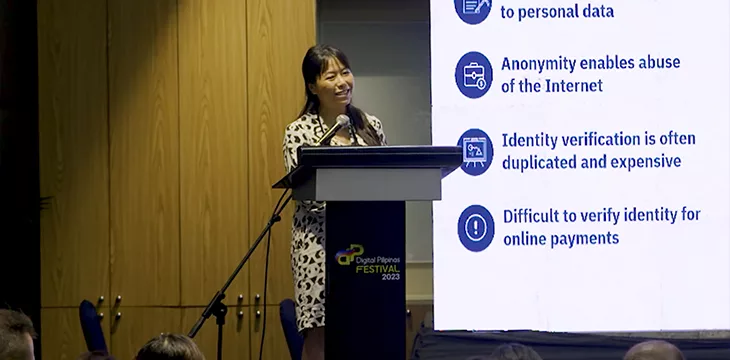
|
Getting your Trinity Audio player ready... |
The world’s gradual shift to Web3 brings a new era on how we perceive privacy and could open vast opportunities for monetizing our greatest asset—our own data—and doing so at our own free will. nChain Chief Information Officer Christine Leong tackled this during her presentation at the Digital Pilipinas Festival.
While the common public has yet to fully grasp the idea of Web3, global economies have been exploring the so-called next iteration of the Internet for quite some time now, with digital identity being one of the focal points of the concept. Currently, over 160 countries are studying the integration of Web3 with a digital ID, according to Leong’s presentation. Even the Philippines is catching up in this digital revolution.
Leong said part of the world’s reason for exploring Web3 is the growing consumer expectations and changing behavior, which were observed at the height of the COVID-19 pandemic when transactions and communications were done online. One striking factor that led to this change is the proliferation of fraud and cyberattacks, resulting in a clamor to ramp up cybersecurity.
“[With] great digitalization, there will be greater fraud and greater risks, but with that, it doesn’t mean we don’t improve—it means that we need to improve on security and protect ourselves in embracing the future of the digital economy,” Leong clarified.
Putting cybersecurity aside, Leong focused on putting digital identity in tandem with digital assets, likening it to verifying one’s identity when purchasing goods and services using banking cards. Combining digital identity and digital assets builds trust in Web3, where digital sovereignty “would be a big thing.”
Businesses have started exploring merging digital identity and digital assets through various blockchain projects, and while they differ in terms of utilization and features, Leong said there needs to be a common standard for them to work on the global stage.
While having digital identity and digital assets work together is essential to enabling Web3, businesses, governments, and the public should be made aware of what digital identity is and what having one entails.
Leong said digital identity goes beyond verifying one’s identity; it also empowers individuals by ensuring that they hold the power to what they wish to do with their data.
“[It’s] really important to think of choice and how we think through users [having] a choice to share their data—what they want to share,” said the nChain CIO.
“We have selective disclosure to say yes or no” on what data to share, she said, adding that pushing for digital identity provides a more secure method of protecting sensitive information in the digital world, where cybercrimes are rampant.
Explaining further, Leong noted that digital identity is not solely about people, as its uses can be applied to specific products as well, including meat and cars.
However, this data empowerment won’t happen easily in today’s centralized systems, with Leong emphasizing the importance of having a decentralized network to enable
interoperability and seamless and trusted data sharing.
“Decentralization really, really helps to augment the centralization.”
Decentralized digital identity also allows greater access to services worldwide, which is particularly important for people traveling overseas and buying properties, among others.
“The aspects of going into the digital world being digital native, whether it’s gaming, whether it’s financial inclusion, without digital identity, there is no inclusion,” Leong stressed. “People don’t get the right access to things if they can’t prove who they say they are.”
Acknowledging these essential aspects, nChain is building an identity solution that would bring all these to reality and one that aligns with the World Wide Web Consortium (W3C) standards, which Leong said is the global emerging standard for decentralized ID on blockchain.
While the concept of a decentralized digital identity is fairly new to common people, countries have started striving to develop and implement such a system in preparation for a fully digitalized economy. In the Philippines, the idea is found in the national government’s eGOV PH Super App.
The application, launched last June and can be downloaded on the Google Play Store and the App Store, integrates all government online services, allowing Filipinos to transact without the need for their physical IDs, including when registering their SIM cards, applying for jobs, going through travel declaration processes, and looking for healthcare assistance.
Leong said that for this project to succeed, the government and the public must recognize identity as a public good and work toward engaging this concept with the private sector.
Concluding her presentation, Leong cited a remark from the inventor of the World Wide Web, Tim Berners-Lee, about the Internet being created without a trust layer.
“In Web3, trusted digital ID and digital assets will both be required in order for the digital world to evolve and benefits realised,” read Leong’s presentation.
Leong reiterated that without digital identity, society won’t evolve.
“In order to get to a trusted environment for a real world of true digitalization, we really need a trusted identity, and of course, with that, also digital assets that are much more native to the digital environment,” she said.
Watch: The role of Web3 in the Philippines’ 10-point socioeconomic agenda
Recommended for you
Lorem ipsum odor amet, consectetuer adipiscing elit. Elit torquent maximus natoque viverra cursus maximus felis. Auctor commodo aliquet himenaeos fermentum
Lorem ipsum odor amet, consectetuer adipiscing elit. Accumsan mi at at semper libero pretium justo. Dictum parturient conubia turpis interdum

 11-22-2024
11-22-2024


